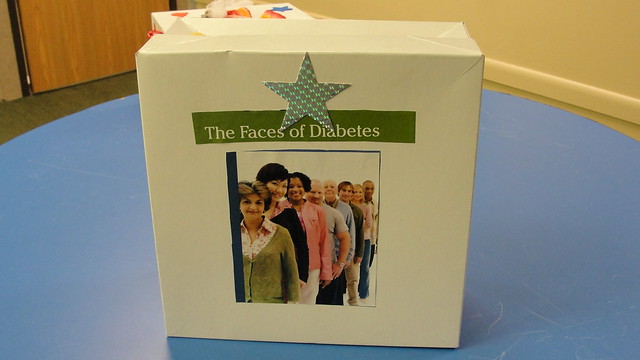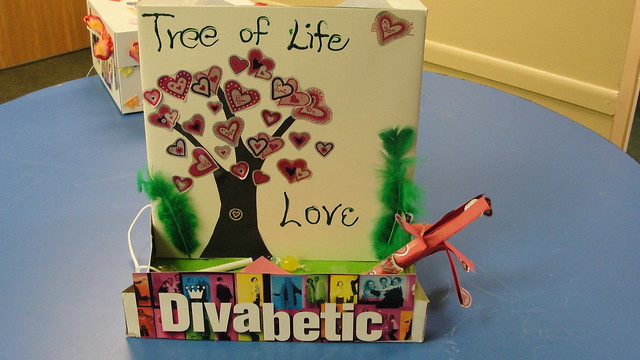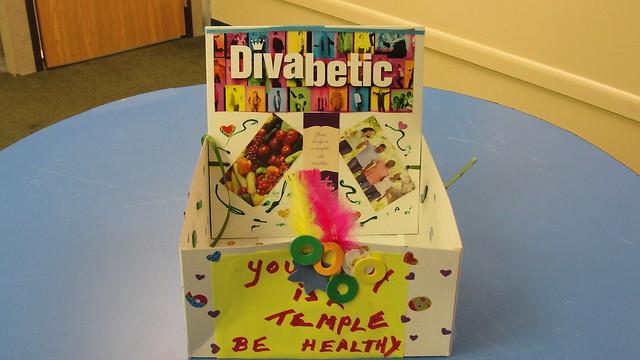Divabetic’s faith-based diabetes community outreach program, “Hat Boxing Competitions,” was presented in multiple tri-state area churches.
This program celebrates the glamour and style of church hats in a hat box decorating contest. Refereed by healthcare host, Mr. Divabetic, this is one competition where everyone wins.

Our program consisted of a Hat Fashion Show celebrating Divas Of Distinction, a Diabetes Care and Education Specialist’s Presentation, a Speed Boxing competition, a Chair Workout, live entertainment, Hat Boxing Presentations and Speeches, and a Grand Prize presentation.

Several weeks before the program, contestants picked up hat-boxing packets containing plain hat boxes, diabetes information, stroke survivor testimonials, and healthy lifestyle messages at the church sanctuary. We also included tips from our favorite diabetes educators, nutritionists, and workout instructors.
Enjoy this nutrition tip from our interview with Jill Weisenberger, MS, RDN, CDCES, CHWC, FAND from our Prediabetes and Type 2 Diabetes Diagnosis Turnaround podcast.
Over 30 contenders from Bethel Deliverance International Church (Wyncote, PA) showed off their creativity at one program.

Hat Boxing contestants brought their decorated hat boxes to the competition. Entries were decorated with messages of diabetes information, encouragement, and empowerment and presented to the judges.

The winners received free hats from Harlem’s Heaven Hats.
New York Fashion hat designer Evetta Petty, the New York City Hat Boutique Harlem’s Heaven owner, shares how she stays on track with type 2 diabetes while running a successful small fashion business.
Carrie Underwood inspires us to discuss Faith and Diabetes on this episode of Divabetic’s popular podcast.
Podcast guests include Patricia Addie-Gentle RN, CDCES, Dr. Beverly S. Adler, PhD, CDE, Neva White DNP, CDCES, Mama Rose Marie, Poet Lorraine Brooks, and special guest Carrie from New York.
Help Us Light the Way During National Diabetes Awareness Month (November)
Approximately 96 million American adults—more than 1 in 3—have prediabetes. Did you know that over 80% don’t know they have it? Prediabetes increases your risk of developing type 2 diabetes, heart disease, and stroke.

This November, join Divabetic’s Blue Candle initiative and encourage your friends, co-workers, and family members to be screened for pre-diabetes. The Centers for Disease Control (CDC) offers a quick, easy online Pre-Diabetes risk test.
Prediabetes Risk Test
Be by their side when they check, and share your experience of living well with diabetes so they can see that living well with diabetes is possible. Together, we can help others come out of the dark, address their diabetes health status, and start living their lives to the fullest.
Clarence Waldron talks about his stroke, recovery, working as Senior Editor and Writer of Jet Magazine, and his memories of Luther Vandross and Aretha Franklin.
Twenty years ago, Clarence interviewed Luther’s mother, Mrs. Mary Ida Vandross, for Jet Magazine after Luther suffered a stroke due to mismanaged type 2 diabetes.
Clarence’s story is an excellent reminder of why it’s essential to ACT F.A.S.T. if you or a loved one is experiencing a stroke. The acronym FAST (Facial drooping, Arm weakness, Speech difficulties, and Time) has been used by the National Stroke Association, American Heart Association, and others to educate the public on detecting stroke symptoms. Earlier treatment results in a greater chance of recovery, a reduced likelihood of permanent disability, and a lesser need for extensive rehabilitation.
You’ll quickly hear Clarence’s upbeat attitude and ferocious appetite for music and divas have served him well during his recovery. Throughout this podcast, we feature music from Aretha Franklin’s Get It Right album and Luther Vandross’s Live At Radio City Music Hall 2003 20th Anniversary Edition album courtesy of SONY Music.







